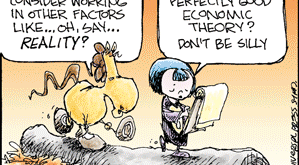Kausalitet — en crash course Yours truly har under några år hållit i en kurs för forskare på Malmö universitet kring kausalitet. Den som är intresserad kan ta del av kursens powerpoint här: Kausalitet — en crash course Många frågeställningar inom samhällsvetenskapen idag handlar i grunden om frågor angående kausalitet. Vad ligger bakom den ökade arbetslösheten? Vilka effekter har friskolorna på elevernas betyg? Men även inom politiken förekommer frågor om...
Read More »Randomization and causal claims
Randomization and causal claims A couple of weeks ago yours truly had a post up here where Julia Rohrer discussed possible alternatives to RCTs for making causal claims: It is instructive to consider cases in which most people readily accept causal claims in the absence of randomized experiments. Nowadays, few people doubt the effects of tobacco smoking on lung cancer. But in the 1950s, tobacco lobbyists embraced the idea that a genetic predisposition...
Read More »Race and sex as causes
Race and sex as causes In the potential outcomes approach to causality, sex and race are often not considered causes since they do not fit within this counterfactual manipulation/intervention framework of causal inference. Sex and race cannot be directly manipulated or intervened on, which is said to make it difficult to conceptualize what the ‘potential outcomes’ would be for individuals if they were of a different sex or race. This leaves us in a...
Read More »Randomization — a philosophical device gone astray
Randomization — a philosophical device gone astray When giving courses in the philosophy of science yours truly has often had David Papineau’s book Philosophical Devices (OUP 2012) on the reading list. Overall it is a good introduction to many of the instruments used when performing methodological and science theoretical analyses of economic and other social sciences issues. Unfortunately, the book has also fallen prey to the randomization hype that...
Read More »Keynes on the importance of ‘causal spread’
Keynes on the importance of ‘causal spread’ No doubt exists that an entirely different subject has taken over control when it comes to education in scientific methodology in almost the entire field, namely statistics … The value of the statistical regulatory system should of course not be questioned, but it should not be forgotten that other forms of reflection are also cultivated in the land of science. No single subject can claim hegemony… John Maynard...
Read More »Use your brain!
.[embedded content] .[embedded content]
Read More »The pitfalls of randomization
The pitfalls of randomization The core purpose of RCTs is to use random assignment in order to ensure that the unconfoundedness assumption essential to identifying an average treatment effect holds. In the abstract, this is a strong argument for the method. Problems arise, however, when pristine asymptotic properties confront the muddy realities of field applications and strict control over fully exogenous assignment almost inevitably breaks down, for any...
Read More »What is a good model?
What is a good model? Whereas increasing the difference between a model and its target system may have the advantage that the model becomes easier to study, studying a model is ultimately aimed at learning something about the target system. Therefore, additional approximations come with the cost of making the correspondence between model and target system less straight- forward. Ultimately, this makes the interpretation of results on the model in terms of...
Read More »Immanuel Kant at 300
April 22, 2024, marks the 300th anniversary of the birth of Immanuel Kant, one of the greatest philosophers in the history of philosophy. Kant’s ideas of the Enlightenment are still relevant, despite the numerous criticisms that have been levelled against them. The Enlightenment was characterized by a spirit of exploration that led to new discoveries in both science and culture. Rather than promoting a narrow worldview, it encouraged people to question assumptions and...
Read More »How Einstein taught me a great lesson
How Einstein taught me a great lesson
Read More » Heterodox
Heterodox








